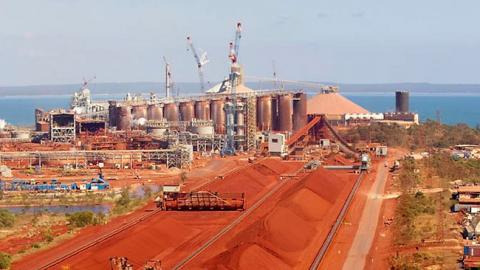
At its height, the asbestos industry reached into virtually every corner of Australia. The latest asbestos story began at an industrial site on the Gove peninsula, in the far north of the Northern Territory.
Zorko Zabic, 74, worked at the Gove alumina refinery in the 1970s cleaning asbestos from pipe works, and was diagnosed with mesothelioma after suffering chest pains early last year.
Zorko Zabic VS Rio Tinto
In January, twelve months after his initial diagnosis, the Supreme Court ruled that Mr Zabic developed the malignant mesothelioma as a result of his exposure to asbestos dust during his time at the Gove refinery, and that Mr Zabic’s exposure was a result of negligence by the then mine operators Alcon Gove, a company that has since been bought by mining giant Rio Tinto.
Even so, the court ruled against the claim because Mr Zabic’s symptoms emerged after the Workers Rehabilitation and Compensation Act came into full force in 1987.
The initial rejection of the claim was a result of the changes made to the workers compensation legislation in the Northern Territory in 1987, amendments that abolished workers’ rights to make a common law claim for injury. This meant that, by law, Zabic had to lodge his claim prior to 1987 in order to be eligible to lodge a common law claim.
But in March the Court of Appeal overturned the Supreme Court’s decision to reject Zabic’s claim, opening the door for Northern Territory asbestos victims to launch legal action, irrespective of when their symptoms first began to emerge.
Mr Zabic’s lawyer, Roger Singh from Shine Lawyers, says that the case and the ruling was an important one, adding that the decision would have widespread implications for the Northern Territory.
“Today’s decision is a win for workers, a win for their families and a win for humanity,” he said after the ruling.
Singh believes that the ruling will pave the way for many asbestos victims in the Northern Territory who have previously been denied justice to come forward and seek redress for themselves and for their families.
The asbestos court case ruling
In March, Mr Zabic won his case against Rio Tinto. It was decided that Mr Zabic should be paid $425,000 in compensation, a decision that his lawyers described as just the “tip of the iceberg” of potential asbestos related cases in the Northern Territory.
On top of compensation, Rio Tinto also provided an undertaking to the court to pay Zabic’s legal costs.
Rio Tinto challenges asbestos compensation ruling
Three months after Mr Zabic won his appeal, the High Court allowed Rio Tinto to challenge the ruling, but still required the company to pay Mr Zabic the decided $425,000 in compensation.
In an August 2015 ruling, the High Court threw out Rio Tinto’s appeal.
What can you do to help victims of mesothelioma?
If you’re concerned about the impact of asbestos-related illness such as mesothelioma, there are steps you can take to help. The Bernie Banton Foundation is a not-for-profit organisation that aims to make a difference by helping to alleviate exposure to asbestos, and promotes asbestos awareness, education and advocacy.
To make a donation, please visit The Bernie Banton Foundation’s website.



